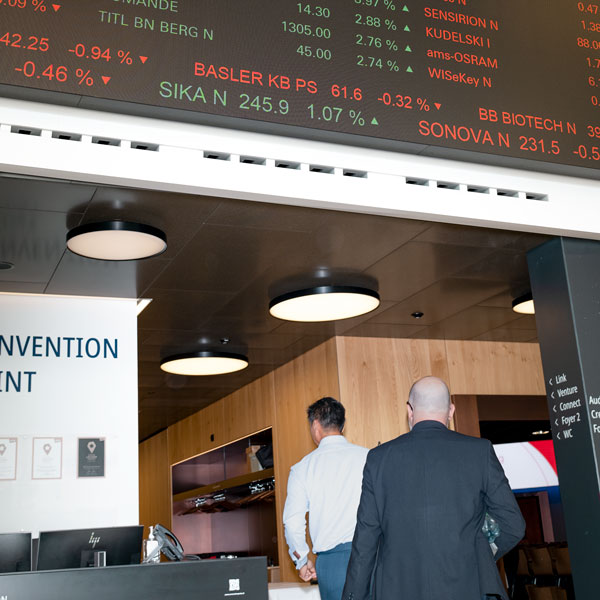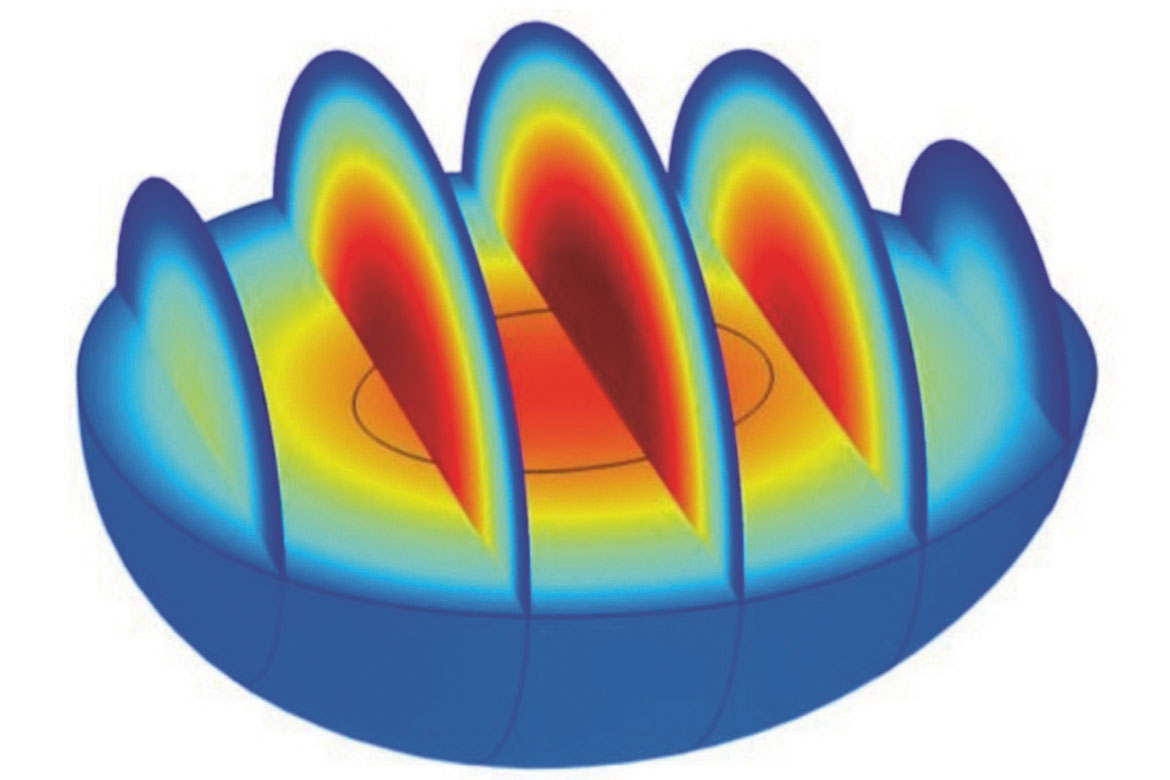Digital uncertainty
Populism on the Internet could potentially undermine democracy in Switzerland. But it’s only since its recent electoral successes that ‘digital populism’ has become a focus of public attention here – and also a focus of research.

Unverifiable assertions and manipulations are as dangerous to democracy as flooding to a city. No wonder Helvetia by the Rhine in Basel looks pensive. | Photo: Keystone/Branko de Lang
In Europe, 2017 is a ‘super election’ year. There are going to be elections in the EU’s two big players, France and Germany, and in several other countries. But this time everything is different. Since Donald Trump’s success in the US presidential election, a spectre is haunting Western democracies: digital populism. Controversial discussions have now been taking place about whether there is a connection between the success of the populists and their social media campaigns.
Researchers are hesitant about drawing conclusions. At the Institute of Communication and Media Studies (icmb) at the University of Bern, Thomas Häussler warns against blaming Facebook and other social media for the successes of the populists. “Of course populists make clever use of social media – here in Switzerland, that primarily means the Swiss People’s Party (SVP)”, says Häussler, who is researching into political communication and online mobilisation. “But for them it’s just one more channel of communication”.
The classical media still have more of an influence on the political opinion-forming process, he says. In Switzerland, that’s mostly the newspapers. Elsewhere, it’s the TV. If we were to pull the plug on Facebook tomorrow, the political landscape would not change fundamentally, he says. The political polarisation that already exists would not disappear overnight.
A direct line to the people
Fundamentally, however, online platforms and populism are indeed an ideal combination: “Populists look for a direct line to the people”, explains Sven Engesser of the Institute of Mass Communication and Media Research at the University of Zurich. At the National Center of Competence in Research (NCCR) ‘Democracy’, he is researching into populism and the mass media. “Facebook and Twitter enable them to feel the supposed pulse of the people, and to convey their messages to them without the detour of using the classical media”.
The role of social media in the rise of populist movements has until now been subjected to remarkably little scholarly research, says Engesser. Research into digital populism is made more difficult because there is no generally recognised definition of ‘populism’. This is itself in part a result of the heterogeneity of the parties and movements generally described as being ‘populist’.
Offline populism online
Engesser and other researchers at the University of Zurich have been engaging with the content that populists from Switzerland, Austria, Italy and Great Britain have been spreading on the Internet. What they all have in common is that they see themselves as the ‘true’ representatives of an idealised people that is in constant conflict with supposedly remote elites. The digital content of the populists largely corresponds to their offline content. Whereas left-wing populists tend to attack the economic elites – thus large corporations and banks – the right-wing populists fire off tweets, make posts and publish online articles against political elites and migrants. Criticism of the traditional mass media mostly comes from the right wing.
In this rejection of mass media, Thomas Häussler sees an important characteristic of populism in the Internet. It is particularly pronounced in the debate about the so-called ‘lying press’ in Germany. “In historical terms, the public prestige of journalists was never very high. But in recent years it’s sunk even further”.
The strategic value of insecurity
The media now receives widespread, basic criticism of a kind that was unheard of for many years. And the populists are turning this loss of trust to their advantage. Häussler says: “They accuse the traditional media of being part of an elite that is conspiring against the people and intentionally trying to manipulate them”. This accusation is diametrically opposed to the values propagated in journalism’s codes of practice, such as independence and a responsibility towards the public. It is not surprising that many populist parties – in Switzerland, that’s first and foremost the SVP – are demanding the downsizing or even the abolition of public service broadcasters, because they are supposedly the standard-bearers of the elite.
In its online expression, however, this anti-elitist stance leads precisely to a dissolution of journalistic standards. Suddenly, dubious sources such as the Swiss conspiracy theorists’ portal ‘Alles Schall und Rauch’ (‘All hollow words’) is afforded the same journalistic significance as a Neue Zürcher Zeitung. Gut feeling and ‘healthy common sense’ count more than expert knowledge and verifiable facts. It has even become easy to spread fake news by means of fictitious online articles that mimic the style and layout of the traditional mass media. Engesser and Häussler suspect that a conscious political strategy lies behind this. People who feel insecure tend to seek support from charismatic leaders and simple ideologies. And this is exactly what the populists offer.
Is nothing true anymore?
This erosion of journalistic standards can have a long-term negative impact on political processes. Under these circumstances, the media cannot fulfil their role as the fourth estate, with their function of critique and oversight. If everything is relative, it becomes ever more difficult to form a fact-based opinion and to debate political topics. “You then get stuck in the meta-discussion as to whether the basic information presented by the media and experts is actually true – indeed, whether anything at all that the media report is true”, says Häussler. “In extreme circumstances, this way of thinking undermines democracy”.
This relativisation of facts is promoted even further by so-called echo chambers or ‘filter bubbles’. These two concepts have become common-place and are used to describe the tendency for people to surround themselves on the Internet with others who think similarly, and who engage in mutual confirmation of their attitudes. This phenomenon is not new, when one considers that newspapers faithful to specific parties dominated the Swiss scene until the 1960s. Thomas Häussler agrees, but he points out: “If you wanted to know that there were other opinions apart from the one in your party newspaper, you just had to take a step back at the kiosk for you to see the newspapers of the other parties”.
Taking a step back – adopting a neutral, bird’s eye-view, as it were – is no longer possible in the Internet, says Häussler, because with every new click, its users are constantly changing their communicative network. Algorithms use their activity to ensure that users see content that corresponds mostly to their own presumed worldview. And this trend is further intensified by the micro-marketing companies that have specialised in tailored Internet advertising.
When the Internet ‘flows over’
Up to now there has been no empirical proof that filter bubbles in the Internet have helped the populists to electoral victory. Both Häussler and Engesser assume that there is a so-called spill-over effect, meaning that, by reporting on tweets, blogs and Facebook entries, the traditional media act like continuous-flow water heaters. They merely serve to amplify the impact of those tweets and blogs, far beyond the actual bounds of social media.
populists offer.
To survive in the battle for coverage (and thus for advertising revenue), the classical media are increasingly orienting themselves to social media. “Drama, emotions, clear messages – everything that populists offer in tweets and in Facebook posts can get more people to read an online newspaper article, for instance”, says Engesser. These statements often cannot withstand fact-checking. But once they’ve been disseminated, it’s difficult to disprove them. Although the populists and the supposedly lying mass media are at loggerheads, paradoxically they profit from one another, Engesser adds. The tirades of the populists provide the clicks, while the mass media spread their messages.
This problem has become especially virulent in countries where politics is highly polarised, and where media supportive of the state (and thus, in the eyes of the populists, allied to the ‘elites’) are unable to assume a moderating function. A paramount example is the USA, where the public service broadcasters are very weak. During the presidential election, the US mass media simply fell short with their cultivation of indignation, says Thomas Häussler. “By taking up every hair-raising tweet by Donald Trump and disseminating it in their quest for clicks and advertising, they ultimately promoted his policies too”.
Martin Zimmermann is a freelance journalist in Bern.
S. Engesser et al.: Populism and social media: how politicians spread a fragmented ideology. Information, Communication and Society (2016)




